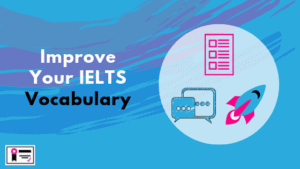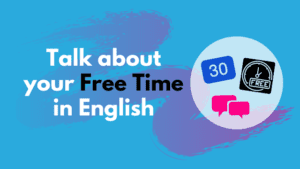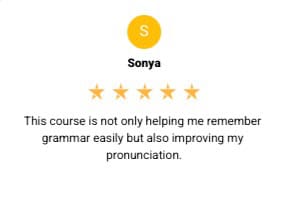10 Useful Phrasal Verbs for Any Topic in IELTS Speaking
👇 Take this lesson with you! 👇
Phrasal verbs are extremely common in natural spoken English and since sounding natural is the key to success in IELTS Speaking, you should be using some of them.
Here are 10 useful phrasal verbs that will make your English sound more natural, and that will help you get a higher score in IELTS Speaking.
What are phrasal verbs?
Phrasal verbs are two-word or three-word phrases consisting of a verb plus an adverb particle.
In spoken English we use lots of phrasal verbs. Sometimes the meaning is clear, but more often than not, the meaning is idiomatic and difficult to guess just by looking at the words.
A phrasal verb can have two parts:
Verb + Adverb Particle
For example,
Put off = to postpone
Pass away = to die
Make out = to identify something that is to clear
Sometimes, a phrasal verb can have three parts:
Verb + adverb particle + preposition
For example,
Look up to = to admire
Why use phrasal verbs in IELTS speaking?
There are two main reasons. Firstly, phrasal verbs make you sound much more natural, which is important in IELTS Speaking.
What’s more, a lot of them are idiomatic and using less common idiomatic vocabulary is a key criteria for IELTS Speaking.
Let me talk in more detail about sounding natural.
How to sound natural in IELTS speaking?
Many students find it difficult to sound natural when they speak English. This may be because they have learnt English from out-dated course books.
The key to success in IELTS Speaking is using natural conversational English.
You don’t always need to use long complicated words, like this;
I am full of adoring admiration for my teacher.
That’s just not natural. In fact, and not everybody knows this, the most natural spoken English often uses simple words, like this;
I look up to my teacher

Phrasal verb #1 'crop up'
To crop up – appear unexpectedly / suddenly (=to pop up)
I have to work late today, something cropped up (at work)
We can use this with the following:
- Problems
- Shops
- Opportunities
- Restaurants
Here are some examples,
(Present Continuous)
In my hometown Chinese restaurants are cropping up everywhere
(Present Perfect)
In my hometown Chinese restaurants have been cropping up everywhere
Phrasal verb #2 'nail down'
To nail down – identify clearly
We can use this with the following:
- An answer
- A date
- A time
- A reason
If the IELTS examiner asks you:
Why do you think….?
You could say,
Well it’s hard to nail down the reason, but maybe it’s because….
Another phrasal verb you can use in this context is
To single out – choose one from a group for special treatment
Again, if the IELTS examiner asks you:
Why do you think….?
You could answer…
I would single out one main reason, and that is….

Phrasal verb #3 'iron out'
To iron out = get rid of = be free of = no longer exist
We can use this with the following:
- Problems
- Difficulties
- Misunderstandings
In IELTS Speaking Part 3 we often have to talk about problems and solutions. – A common question might be;
How can we solve this problem?
A good answer can be;
The best way to iron out this problem is to….
Phrasal verb #4 'pack in'
To pack in = to stop doing something
We can use this with the following:
- Jobs
- Courses
- Hobbies
Here are some examples,
I went to the gym for 3 months but then I packed it in. I didn’t have enough time to go.
I want to pack in my job. It’s not very rewarding and badly paid.
I took up painting, but then packed it in, because I didn’t enjoy it.
Phrasal verb #5 'ache for'
Phrasal verb #6 'drag on'
To drag on = last longer than necessary
The meaning might be clearer if we look at the noun.
A drag (n) which means ‘boring’
(Present Perfect)
The pandemic has dragged on for such a long time.
(Present Perfect Continuous)
The pandemic has been dragging on for such a long time.
It can be useful in IELTS Speaking Part 2, especially when describing situations that are boring.
The conversation dragged on for so long
The party dragged on for so long
The lesson dragged on for so long
The meeting dragged on for so long
Phrasal verb #7 'do away with'
Do away with something = to remove, stop, abolish
We can use this with the following:
- laws
- rules
- taxes
- restrictions
- obligation
It can be useful IELTS Speaking Part 3 if the examiner asks the following;
What do you think about….?
Some possible answers for different contexts could be;
I wish we could do away with masks (COVID)
The government should do away with this law (NEW LAW)
We should do away with exams (EDUCATION SYSTEM)
In spoken English, we often repeat ideas, phrases, in a slightly different way. So, you can do the same here. You can use a phrasal verb in one phrase, and then use the meaning in the second phrase. See this in the example below;
I think we should do away with exams, the government should abolish them.
Phrasal verb #8 'set me back'
It set me back = it cost a lot of money
We usually use this phrasal verb when we want to say something was expensive, or too expensive. So it has a slightly negative connotation.
It set me back 5 dollars
It set me back a lot money
It set me back a fortune
It set me back a fair penny

Phrasal verb #9 'slip up'
To slip up = make a mistake
The meaning is clearer if we look at the original verb: to slip which means ‘to fall’ because the ground is smooth, icy or has a banana peel on it!
We can use this with the following:
- Work
- Relationships
- Government
Here are some examples,
The government has slipped up with their new policy on travel restrictions
I slipped up at work yesterday, I made a huge mistake, I lost my managers presentation
I slipped up yesterday, I forgot my wife’s birthday
Phrasal verb #10 'flick through'
To flick through = to look through quickly
We can use this with the following:
- A book
- A magazine
- A newspaper
- A photo album
Given that we now also read many things in a digital format, the more modern version of this phrasal verb is,
To swipe through = to look through quickly
This can be useful in IELTS Speaking Part 2, for example when we have to describe an article; a piece of news; a photo
For example,
I was flicking/swiping through the newspaper the other day and saw an article about healthy eating.
How to learn phrasal verbs for IELTS speaking
I think rather than learning a list of lots of phrasal verbs, it’s better to learn them in a given context.
The key is to make sure you understand the meaning and then try using them.
Ideally, try and get feedback from a teacher, tutor or a native speaker, who can let you know if you are using it correctly.
That’s it, have fun with phrasal verbs and start speaking more natural spoken English.
If you liked this lesson, leave me a comment below and let me know which phrasal verb you are practicing today. Give me an example sentence.

Improve your Speaking Skills with this Free Course
Crack IELTS Speaking Part 1
Learn to Speak with Confidence in Part 1 of Your IELTS Test!
⭐️⭐️⭐️⭐️⭐️
‘It’s such a great course. I’ve learned so many usages for speaking part 1.’
Zu Htet






22 thoughts on “10 Useful Phrasal Verbs for Any Topic in IELTS Speaking”
as useful as always
Thank you so much!
your lessons are awesome! Thank you!
So kind – thanks!
Great thanks for sharing. I’ve watched many of your videos on English speaking and benefited a lot from them.
I cant describe how much you helped me !!! You’re such an amazing teacher, very clever man with a great sence of humor and huge knowledge. Really thank you very much!!!
Thank you Anna – so pleased I can help!
A unique approach of teaching
Thank you!
What a good job
Thanks
Thank you sir and God may bless you and your family .Sir can you inform about your free English classes because I’m a poor student.
I do live lessons on my Youtube channel (English Speaking Success) Thursdays at 10am Spain time.
Great job Mr Keith. You have a great way with words. Keep your struggle very much alive. I have been watching your you-tube videos, and it’s a great fun learning.
So pleased to hear that and thanks for the feedback!
You are great Sir
thank you
I feel bad that I’ve found your video just 3 days ahead f my exams sir. If it was earlier it wud hv been far more better. Enjoyed ur lessons.
Hope the exam went well!
Thank you sir and God may bless you and your family
Thank you so much
Very usefull